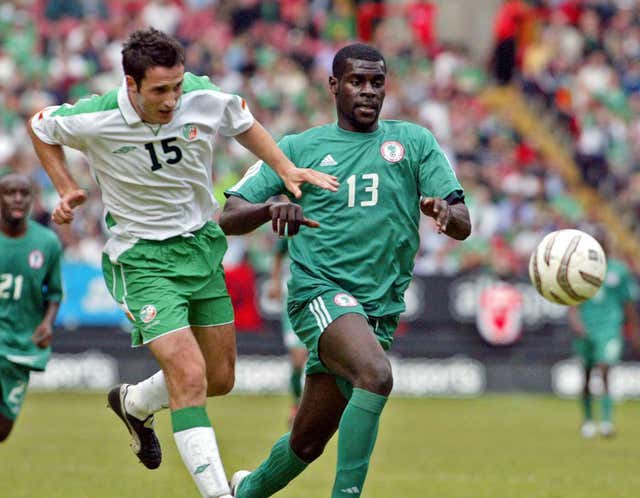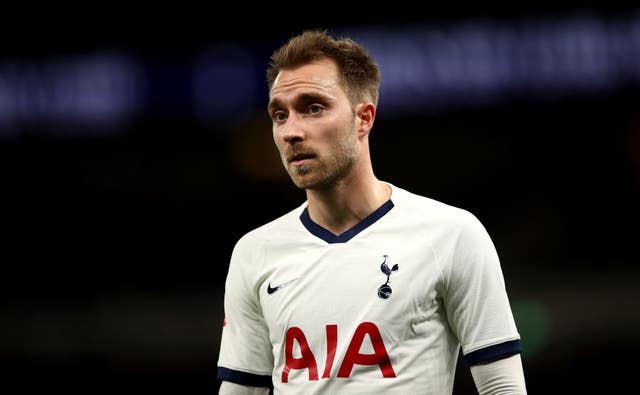Christian Eriksen's cardiac arrest must never be forgotten if sport wants to save lives, according to Clive Clarke.
Midfielder Eriksen collapsed during Denmark's opening Euro 2020 game with Finland on Saturday and needed to be resuscitated on the pitch.
Former Stoke defender Clarke suffered his own cardiac arrest during half-time while playing on loan for Leicester at Nottingham Forest in August 2007.
A message from @ChrisEriksen8.♥ï¸ðŸ¤ pic.twitter.com/WDTHjqE94w
— DBU – En Del Af Noget Større (@DBUfodbold) June 15, 2021
He was revived by quick-thinking staff and medics and, with Eriksen now recovering in hospital after needing a defibrillator, Clarke insists what happened needs to remain in the spotlight to save others.
He told the PA news agency: "You can't just draw a blanket over it and pretend it never happened. It does happen and unfortunately there are not as many people like myself and Christian who live to tell the tale.
"For the average person, they don't need to think about it. It goes to the back of their minds. Everyone will be talking about it this week but in two weeks they will be talking about who scored a goal in the semi-final of the Euros.
"That's life, things move on and people forget and talk about what's current.
"The good thing which will come out of this is that Christian makes a full recovery and that it shows these things are important to have in place, so there are even more defibrillators around the country and the world.

"I've had hundreds of texts in the last few days asking 'are you OK? Has it brought back memories?'
"No, I live it every day. I have an internal defibrillator in my chest, I have a machine on the side of my bed and every time I wake up I look at my machine and it's a daily reminder of what happened.
"We all live in our own world and everything is in the fast lane these days."
The former Republic of Ireland international also called for defibrillators to be made mandatory at any sporting venue, including grassroots, after one helped save his life.

"Not only football, any sport which is high intensity. I feel sometimes sport and governing bodies tick a box and do the bare minimum," said the 41-year-old, who is a patron for Cardiac Risk in the Young.
"This is proof you have to do that bit more by having the defibrillators ready for any sport – grassroots, schools, whatever it may be. They should be there and it should be made part of society where they are very easily accessible.
"A defibrillator, at any sporting venue, big or small, should be readily accessible. It should be mandatory. Then we know the incidents can be dealt with really swiftly.
"You can go further and say should people be taught at school and given the correct training which helps them to react in a positive way?"
Clarke was watching the game in Copenhagen, which Denmark lost 1-0 after it was controversially restarted 90 minutes after Eriksen's collapse, and instantly knew what had happened to the former Tottenham star.
Respect to the medics and all the danish players for this. Hope Eriksen recovers soon as brought up a lot of memories for myself. #PrayForEriksen🇩🇰â¤ï¸ pic.twitter.com/nRuGle2BOn
— Clive Clarke (@cliveclarke3) June 12, 2021
"I saw it happen and knew it was the same as me, straight away I thought he'd had a cardiac arrest," Clarke said. "The way he fell and, to lose consciousness as he did, I felt straight away he's had what I had.
"I am one of the few who has had to live through that.
"The way the players, medical staff and referee reacted was first class. The way they reacted was phenomenal."
Clarke, now a football agent, never played again after his cardiac arrest at the City Ground and left Sunderland on medical grounds in 2008 having made 285 career appearances for Stoke, West Ham, the Black Cats, Coventry and Leicester.
Eriksen's future and prognosis is still to be determined but Clarke believes there must be a realism around his situation and the Inter Milan man needs to remain strong.

"The likelihood of him playing again after having a cardiac arrest is very low, that's just common sense," he said.
"It's a massive mix of emotions, it's the relief of waking up and knowing you're one of the lucky people who has survived, then you're told the likelihood of never playing football again is very high.
"A lot of players retire when it's right for them but with this it is instant. That was very hard for me to take and years later I still found that side of it really difficult.
"People don't see that psychological damage it does to you. Christian will not need to worry about the financial aspects because he is such a fantastic player but I did. I had to get back to work pretty quickly.
"If the worst-case scenario happens and he can't play again, hopefully he is OK and can sit back and think about the next stage of his career."
/https%3A%2F%2Fsportsmole-media-prod.s3.gra.io.cloud.ovh.net%2F21%2F22%2Fchristian-eriksen.jpg)
/https%3A%2F%2Fsportsmole-media-prod.s3.gra.io.cloud.ovh.net%2F21%2F12%2Fdenlog.png) Denmark
Denmark
/https%3A%2F%2Fsportsmole-media-prod.s3.gra.io.cloud.ovh.net%2Fuploads%2F2025%2F11%2Fimago1067594787-1-6919a3fcb7b78907255155.jpg)
/https%3A%2F%2Fsportsmole-media-prod.s3.gra.io.cloud.ovh.net%2Fuploads%2F2025%2F11%2Fscotland-captain-andy-robertson-celebrates-during-a-world-cup-qualifier-on-november-18-2025-pro-sports-images-691d519dd016a309530062.jpg)
/https%3A%2F%2Fsportsmole-media-prod.s3.gra.io.cloud.ovh.net%2Fuploads%2F2025%2F11%2Fimago1069348227-691cf387b0b31309884479.jpg)
/https%3A%2F%2Fsportsmole-media-prod.s3.gra.io.cloud.ovh.net%2Fuploads%2F2025%2F10%2Fimago1067580630-1-68e9061193e7d150924022.jpg)
/https%3A%2F%2Fsportsmole-media-prod.s3.gra.io.cloud.ovh.net%2Fuploads%2F2025%2F09%2Fimago1067002084-68d81cb7755dd355621187.jpg)
/https%3A%2F%2Fsportsmole-media-prod.s3.gra.io.cloud.ovh.net%2F25%2F11%2Fmorcal.jpg)
/https%3A%2F%2Fsportsmole-media-prod.s3.gra.io.cloud.ovh.net%2Fuploads%2F2025%2F10%2Fgibbs-white-68fa8c3e4aef8582500673.jpg)
/https%3A%2F%2Fsportsmole-media-prod.s3.gra.io.cloud.ovh.net%2Fuploads%2F2025%2F11%2Faaa-ig-6925512b9dfbc335692011.jpg)